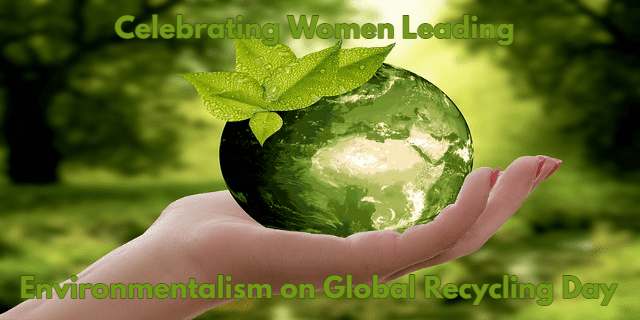Celebrating Women Leading Environmentalism on Global Recycling Day
Author: Allison A. Sakara, NP, MSN, RN, PHRN
“At its core, the issue of a clean environment is a matter of public health.”
– Gina McCarthy, Former Administrator of the U.S. EPA and Climate Change Expert
For more than half a century, women have played a significant role in protecting the environment and addressing climate change. This week marks the intersection of Women’s History Month and Global Recycling Day – an ideal opportunity to celebrate the contributions of women to recycling and environmentalism. Many female figures have championed these causes, which are foundational to the All Hazards, One Health, One Nature (AHOHN) Framework. Across 12 different organizations publishing a list of the Top Ten female advocates of environmentalism, the most commonly cited women are listed below:
- Jane Goodall – Environmentalist and Primatologist
- Sylvia Earle – Marine environmentalist
- Wangari Maathai – Environmentalist, Conservationist, and Social Justice Advocate
- Rachel Carson – Environmentalist and Author
- Vandana Shiva – Environmentalist and Defender of Biodiversity
- Isatou Ceesay – Dubbed the “Queen of Recycling”
- May Boeve – Climate and Environmental Activist
- Marina Silva – Environmentalist and Amazon Rainforest Defender
- Gretha Thunberg – Climate Change Activist and Youth Environmentalism Leader
- Vanessa Nakate – Climate and Environmental Activist
Research shows that women are more concerned than men about the quality of the air that their families breathe and the water they drink. Women also are more likely to make long-term decisions that factor in the impact of their actions on future generations. This demonstrates an inclination towards sustainability, prioritizing the protection of their loved ones and surroundings over other factors, such as convenience or cost. This inclination has put women at the forefront of recycling and many other environmental efforts. Women also tend to be more involved in local government and community organizations, making them more likely to be involved in policy and decision-making related to recycling and other environmental issues.
By recycling, individuals and communities can reduce the amount of waste sent to landfills and the number of resources used to produce new products. Promoting recycling and the other related ‘’Rs” – reduce, reuse, reclaim, repurpose, restore – are key aspects of environmental stewardship typically directed by women. They often are the first to recognize the impacts of human activities on their surroundings and the first to take action to reduce the consequences. With a long-term view of the environment and a wholistic approach to sustainability, women organize campaigns to encourage recycling and actively develop community-based recycling programs.
Women are more likely to participate in household recycling. This activity requires some effort, including separating recyclables from non-recyclables, washing and cleaning items prior to recycling, and transporting articles to recycling centers or other pick-up locations. While men express interest in and support recycling, survey data shows that women are more likely to perform these tasks and prioritize recycling in their homes. Women are also more likely to teach their children and their neighbors about the importance of recycling and encourage them to participate in these efforts.
Community recycling programs are essential for reducing waste and conserving resources. These programs are often run by volunteers and require considerable effort and commitment. Women make up most of those who volunteer for these projects, encouraging others to participate and prioritizing such efforts in their communities. In addition, women are the most common participants in recycling events and campaigns, such as litter cleanups and electronic waste collection events.
Beyond recycling advocacy and education, women remain key players in promoting and protecting the environment. Women are involved in the conservation of natural resources, the defense of wildlife, the campaign for sustainable development, and the reduction of greenhouse gas emissions. Professional organizations, such as WRISE (Women of Renewable Industries and Sustainable Energy), showcase and support the work done by women in the renewable energy fields. Increasing numbers of women are becoming involved in the architecture and construction of green buildings using sustainable materials designed to conserve energy and resources. And the impact of women on the development of green infrastructure, advancement of green transportation options, promotion of green businesses, and the development of green products has been instrumental.
While women vote for candidates across the political spectrum, data shows they are more likely to vote for political candidates who prioritize environmental issues. Support for environmentally-responsible policies and initiatives are crucial steps necessary towards addressing the issues of climate change, pollution, and waste reduction. Women continue to be the major supporters of such policies and initiatives by prioritizing environmental care and welfare in their communities and teaching this to their families.
Women have been and continue to be essential allies in the fight against environmental degradation. Their leadership in sustainability, participation in household and community recycling, and support for environmental policies and initiatives are crucial to the success of these efforts. As we face an uncertain future with the environment and climate change, we must encourage and empower women to continue to take active roles in environmental stewardship and work together to create a sustainable future for ourselves and future generations.
About the Author:
Allison A. Sakara, NP, MSN, RN, PHRN, is a nurse practitioner with decades of experience in pediatrics, hematology/oncology, regulatory affairs, software as medical device (SaMD) consulting, and disaster response. Allison is the Co-Founder and Executive Director of the High Alert Institute.
The High Alert Institute is a 501c3 not-for-profit educational public charity dedicated to providing disaster readiness education and resources to unserved and underserved communities, industries, and charitable organizations in an All Hazards, One Health, One Nature Framework. Learn more about the High Alert Institute at www.HighAlertInstitute.org










